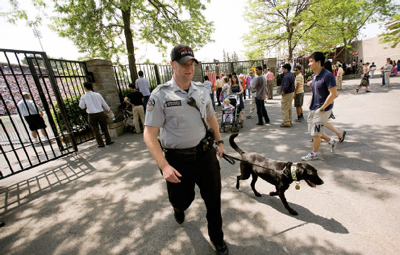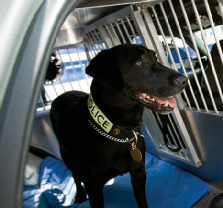One of the University’s most highly specialized employees works for peanuts—or, rather, tennis balls. Named Reggie, he’s a five-year-old black Lab serving as a K-9 officer with the University Police (and moonlighting as chief recycler of used athletic equipment, which the Reis Tennis Center donates by the bagful).

The second dog on the CUPD force—his predecessor, Sabre, retired in 2008—Reggie is the four-legged half of the University’s explosives detection team. He and his handler, patrol officer Kevin Noterfonzo, check University venues for bombs before major events like Commencement and appearances by high-profile visitors such as Convocation speaker Rudy Giuliani. They also investigate suspicious packages, both on campus or (at the request of other law enforcement agencies) elsewhere in the community. “Reggie is a great resource,” says CUPD Deputy Chief David Honan. “If we have a suspected device, we can have Kevin and Reggie come out and render it safe and reopen a building. If we didn’t have that skill set, we’d have to shut down the building for hours and wait for a bomb squad or another dog from out of town—and that’s a lot of money and disruption of University operations.”
Trained as a successor to Sabre, Reggie was adopted at thirteen months through Rudy’s Rescue, an Upstate New York animal welfare group that specializes in Labs. Transferred from a high-kill shelter in Kentucky—where his original owners surrendered him for being too big a handful—Reggie had gone through two failed placements with Rudy’s Rescue when Noterfonzo got a call asking if he was still looking for a K-9 partner. “More or less, the dogs that people don’t want, we want,” Noterfonzo says. “You want to make sure they’re hyper and crazy over a certain toy. Reggie loves his ball, and that’s what he looks for as his reward.”

The pair underwent 180 hours of training through the Southern Tier Police Canine Association in Binghamton, leading to federal and state certification as an explosives detection team; they still do eight-hour refresher courses every other week. “The canine nose is 800 times more powerful than a human’s,” Noterfonzo notes. “There is no technological tool as advanced.” As his uniform, Reggie wears a fluorescent green collar bearing his own tiny badge and emblazoned with the word POLICE; the team’s specially equipped squad car includes a heat-detection system that, in case of an air conditioning failure on a hot day, lowers the windows, turns on the fans, flashes the car-top lights, and pages Noterfonzo. When the team inspects a large building like Bailey Hall—a process that can take several hours—Reggie requires breaks for rest and water every twenty to thirty minutes. “When he’s searching, he’s breathing through his snout and his mouth is closed, so it’s almost like he’s hyperventilating,” says Noterfonzo, noting that CUPD may train a second K-9 officer to share the workload, if funding becomes available. “That really wears him down.”
No longer a rookie, Reggie has his share of war stories. Although most suspicious packages or devices prove to be benign, he did detect explosive residue in the bedroom of a young man whose father had called Ithaca police concerned he might have bomb-making materials. Since Reggie is also trained in search and rescue, he has been called upon to find lost people; in August 2010 he helped locate the body of an undergraduate who had died in an accidental gorge fall. “Reggie found the track of where he had gone,” says Noterfonzo. “He indicated the direction of where we could start looking, and sure enough that’s where we found him.”
The relationship between the partners doesn’t end when they clock out; Reggie lives with Noterfonzo and his family. At home, Reggie has another job: best buddy to the Noterfonzo children, aged nine, four, and one. “He acts more like a kid than a pet,” the officer says. “He has a dog bed, but he sleeps with the kids.” To stay sharp for work, Reggie isn’t allowed to play with tennis balls while off-duty— but there are ample bones, pig ears, and tug toys for his enjoyment. “At home he’s pretty much a pet,” Noterfonzo says, “but he lives like a king.”
— Beth Saulnier
{mp4remote}http://www.cornell.edu/mediavolume/events/2009/20090404_vet_pathology_demo_dl.mp4{/mp4remote}
Caption: Watch Reggie in Action (26:11)


